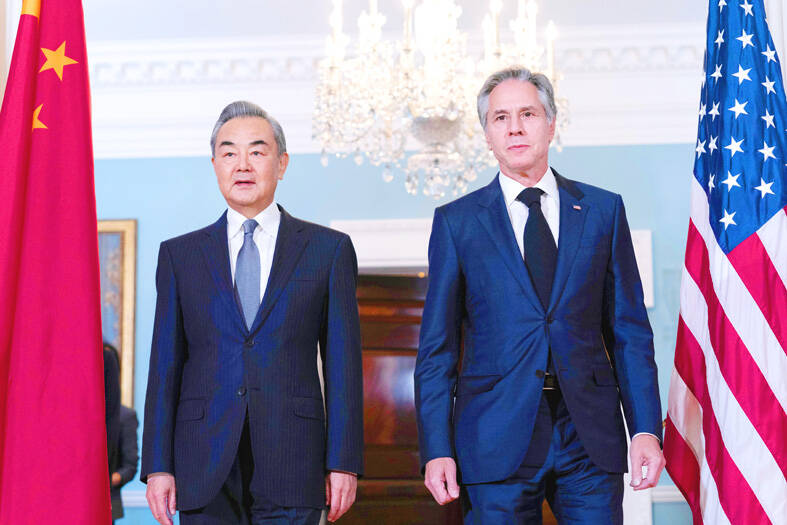US Secretary of State Antony Blinken this week is to pay his second visit in less than a year to China, where he is to ask Beijing to avoid “provocative” measures during next month’s inauguration of president-elect William Lai (賴清德).
Blinken’s trip from Wednesday through Friday marks a further lowering of US-China friction that soared under former US president Donald Trump.
However, US President Joe Biden, while seeking greater stability between the world’s two largest economies, has kept up the pressure.

Photo: AP
In the days ahead of Blinken’s trip, Biden met jointly with the leaders of US allies Japan and the Philippines, both wary of China, and moved to raise steel tariffs on a “cheating” China.
“We are in a different place than we were a year ago when the bilateral relationship was at an historic low point,” a senior US official told reporters ahead of the trip announcement.
“We’ve set out to stabilize the bilateral relationship without sacrificing our capacity to strengthen our alliances, compete vigorously and defend our interests,” he said on customary condition of anonymity.
Amid the issues expected to be discussed is Taiwan, particularly Lai’s inauguration.
“Our expectation will be, particularly during this important and sensitive time leading up to the May 20 inauguration, that all countries will contribute to peace and stability, avoid taking provocative actions that may raise tensions, and demonstrate restraint,” the official said.
US officials quietly believe that improved US-China relations helped avoid worse-case scenarios of Chinese pressure during the elections in January.
Also high on Blinken’s agenda would be what US officials say is a major push by China that has helped Russia, in the throes of the Ukraine invasion, carry out its biggest militarization since Soviet times.
Blinken is to take the message directly to Beijing after encouraging European allies to make their concerns known with China, which is seen as eager for smooth relations with the West as it faces economic headwinds.

Auckland rang in 2026 with a downtown fireworks display launched from New Zealand’s tallest structure, Sky Tower, making it the first major city to greet the new year at a celebration dampened by rain, while crowds in Taipei braved the elements to watch Taipei 101’s display. South Pacific countries are the first to bid farewell to 2025. Clocks struck midnight in Auckland, with a population of 1.7 million, 18 hours before the famous ball was to drop in New York’s Times Square. The five-minute display involved 3,500 fireworks launched from the 240m Sky Tower. Smaller community events were canceled across New Zealand’s

The Ministry of Foreign Affairs (MOFA) yesterday said it is closely monitoring developments in Venezuela, and would continue to cooperate with democratic allies and work together for regional and global security, stability, and prosperity. The remarks came after the US on Saturday launched a series of airstrikes in Venezuela and kidnapped Venezuelan President Nicolas Maduro, who was later flown to New York along with his wife. The pair face US charges related to drug trafficking and alleged cooperation with gangs designated as terrorist organizations. Maduro has denied the allegations. The ministry said that it is closely monitoring the political and economic situation

‘SLICING METHOD’: In the event of a blockade, the China Coast Guard would intercept Taiwanese ships while its navy would seek to deter foreign intervention China’s military drills around Taiwan this week signaled potential strategies to cut the nation off from energy supplies and foreign military assistance, a US think tank report said. The Chinese People’s Liberation Army (PLA) conducted what it called “Justice Mission 2025” exercises from Monday to Tuesday in five maritime zones and airspace around Taiwan, calling them a warning to “Taiwanese independence” forces. In a report released on Wednesday, the Institute for the Study of War said the exercises effectively simulated blocking shipping routes to major port cities, including Kaohsiung, Keelung and Hualien. Taiwan would be highly vulnerable under such a blockade, because it

UNRELENTING: China attempted cyberattacks on Taiwan’s critical infrastructure 2.63 million times per day last year, up from 1.23 million in 2023, the NSB said China’s cyberarmy has long engaged in cyberattacks against Taiwan’s critical infrastructure, employing diverse and evolving tactics, the National Security Bureau (NSB) said yesterday, adding that cyberattacks on critical energy infrastructure last year increased 10-fold compared with the previous year. The NSB yesterday released a report titled Analysis on China’s Cyber Threats to Taiwan’s Critical Infrastructure in 2025, outlining the number of cyberattacks, major tactics and hacker groups. Taiwan’s national intelligence community identified a large number of cybersecurity incidents last year, the bureau said in a statement. China’s cyberarmy last year launched an average of 2.63 million intrusion attempts per day targeting Taiwan’s critical